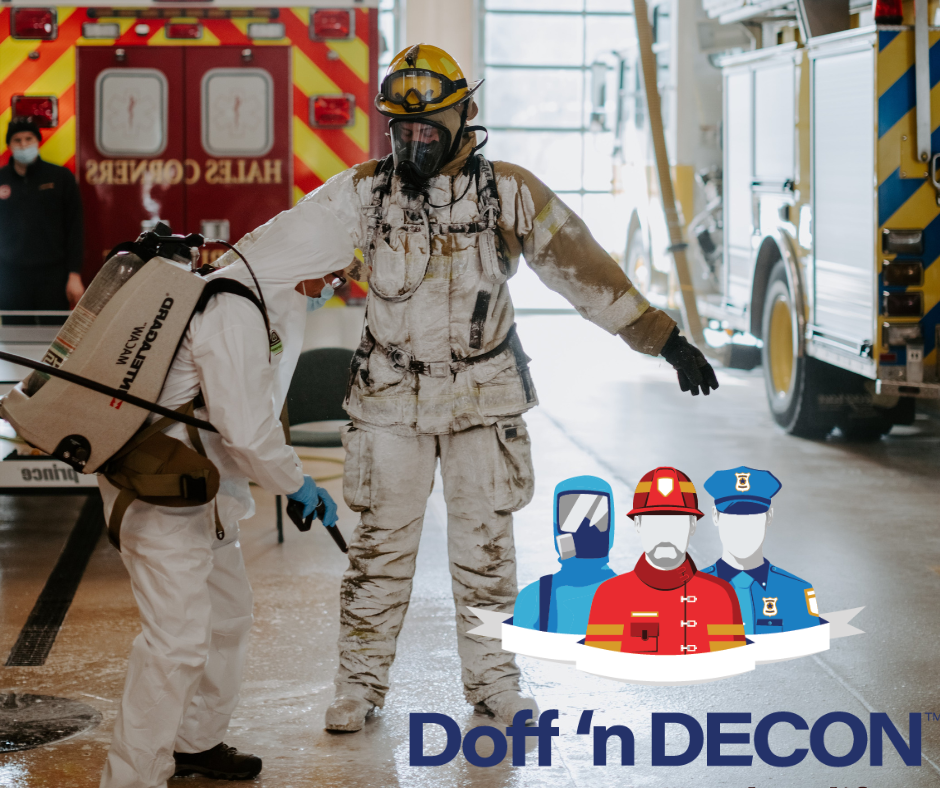Firefighters today seek to understand the why of things, rather than simply following orders without questioning them; gone are the days of rubber boots and steam engines. Today’s firefighter uses the big picture in order to apply acquired knowledge and practiced skills in a healthy and efficient manner.
Those who work as firefighters are at a higher risk of developing cancer than workers in other professions. Why? This is due to their exposure to a range of toxic substances, such as heavy metals, volatile organic compounds (VOC’s), and other carcinogens present in smoke, soot, and other byproducts of fires. These substances can penetrate firefighters’ protective gear and get onto their skin and clothing, increasing the risk of cancer and other health problems.
While cleaning gear with soap and water is important, it is not enough to prevent the risk of cancer. Firefighters need to understand why cleaning their gear is drastically different from decontaminating their gear.
Soap and water versus a decontamination formula. Soap is a lifting agent. When you wash your hands, you apply soap. Do you just stand there and hold your hands under the running water until all the soap is rinsed off? No! You rub your hands together and some of us even sing the Alphabet Song or maybe you are among those who understand that it takes approximately 1 minute of rubbing your hands, between your fingers, etc. to really clean them. Why is this? In simple terms, soap (a great lifting agent) lifts the dirt and bacteria out of your pores and then the friction from rubbing your hands together kills the virus or bacteria.
This is a very similar process to using soap in an extractor to clean gear. The soap will lift some of the bacteria and viruses from the gear and then the extractor causes friction to take the contaminants off. Have you ever wondered where the chemical contaminants then go??? Hmmm.
Doff ‘n DECON is a decontamination formula that cleans and decontaminates all in one product. Doff ‘n DECON contains three parts that, when mixed together, create one superior decontamination formula targeted at heavy metals and VOC’s left on gear after a fire incident. Part 1 is soap/surfactants because lifting contaminants out of porous material is important. Parts 2 and 3 are hydrogen peroxide and an oxidizing booster. These two components go on a mission and attack the negatively charged contaminants found on turnout gear, suppressing the VOC’s and breaking the chemical bonds in the heavy metals so that cancer-causing carcinogens are removed and neutralized.
If you truly want to understand the big picture – keep reading.
Doff ‘n DECON is UL-verified for the NFPA 1851 – without the use of an extractor. Yes, it can be used in an extractor but if you truly understand the why, you know that bagging contaminated suits and taking them back to the station increases the spread of cancer-causing carcinogen by cross contamination.
Hazmat teams are not allowed to leave the scene until the incident has been safely decontaminated. When a firefighter exits an incident site, that person and their gear now become a hazmat situation that needs to be decontaminated on-scene as well.
The minute you come off of your breathing air you are exposed to VOC’s and other cancer-causing carcinogens. My suggestion is to apply the decontaminant onto the suit before you even come off your breathing air. It only takes about 90 seconds to suppress the VOC’s, and this will help to reduce your exposure.
Doff ‘n DECON needs to remain on treated gear for the required 10-minute dwell time. Does this mean you need to stay in your gear? No – spray down the gear, take it off, throw the jacket on the ground, but make sure the foam remains wet on the gear for 10 minutes. After the dwell time expires, you can rinse on-scene and keep the gear in service or know that the gear has been decontaminated so you can safely bag it and take it back to the station for a rinse cycle in your extractor.
While cleaning gear with soap and water is important, it is not enough to prevent the risk of cancer. Firefighters need to understand the importance of decontaminating their gear with a product like Doff ‘n DECON, which contains three parts that work together to target heavy metals and volatile organic compounds found after a fire incident. Conduct on-scene decontamination to prevent cross-contamination and reduce exposure to cancer-causing carcinogens.
Continue to challenge and educate yourself on the risks of exposure so you can properly decontaminate your gear so you may continue to fight fires. Not Cancer!

